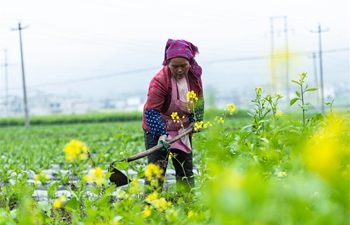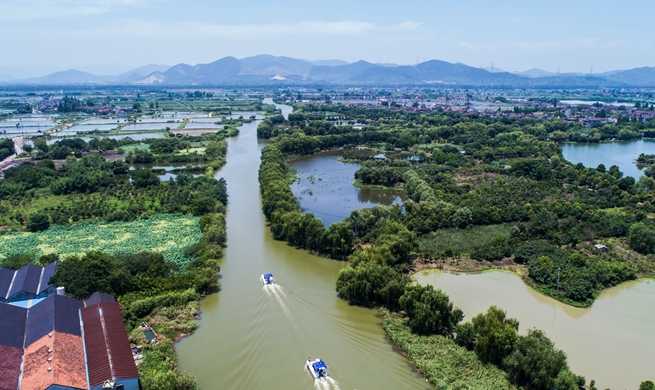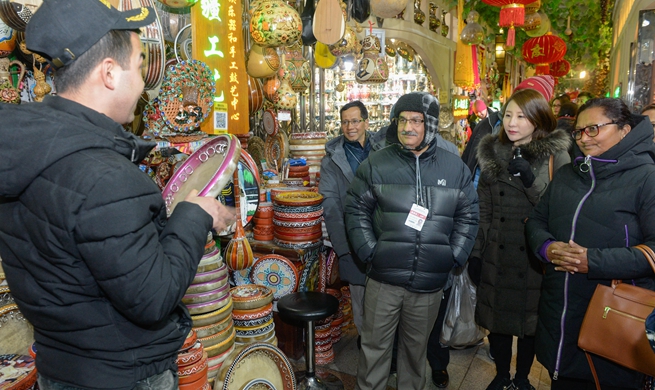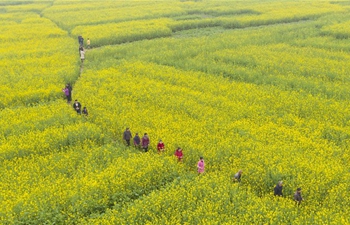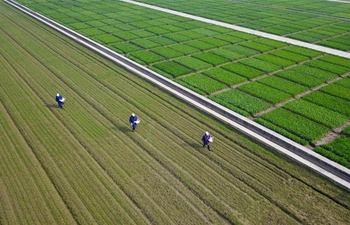NAIROBI, March 1 (Xinhua) -- The animal's black head and its white body makes it stand out as it grazes in the field, with one being able to pick it out from far.
The sheep, known as Dorper, a breed developed in South Africa, has become a sensation among many Kenyan farmers especially in the dry areas because it is hardy and offers more returns.
Farmers in the rangelands of the east African nation are, therefore, replacing their local breeds that include Red Maasai with the Dorper sheep to earn more.
From Narok to Kajiado, Makueni, Machakos and parts of the dry northern Kenyan rangelands where sheep farming is pre-dominant, the Dorper sheep is taking the pride of place on farms thanks to its ability to withstand the vagaries of climate change.
Moses Oletip, a sheep keeper on the border of Kajiado and Makueni counties, said that he embraced the Dorper sheep after learning of its resilience from fellow farmers.
"I was surprised that even during times of drought when pasture is scarce, the Dorper sheep still retains its big body. This is good for the farmer because it fetches more in the market since most buyers tend to offer less money for animals that have small body frames," Oletip said recently.
A grown-up Dorper ram weighs about 150 kg, a weight that exceeds that of local breeds.
In the market, while a Dorper ewe fetches some 30,000 shillings (about 300 U.S. dollars) and a ram up to 500 dollars thanks to their remarkable weight, the local breeds go for as little as 70 dollars.
The weather patterns in Kenya have changed radically as the east African nation grapples with effects of climate change.
The rains have increasingly becoming scarcer, a situation that has forced Kenyan farmers especially those in the rangelands to become smarter to continue reaping from livestock rearing.
While some farmers are importing the sheep from farms in South Africa, others are buying them from Dorper breeding farms set up in the east African nation.
"We imported our Dorper sheep from South Africa and our goal is to breed them to increase the numbers so that we can start selling them for meat," Paul Sosoika, a manager at Osiligi Farm in Kajiado County, said.
In the county, Arroi Dorpers Farm is one of the places where farmers in search of the hardy sheep can buy them for rearing or breeding, with the animal springing up business opportunities.
The Dorper is a cross-breed between the Persian ewe and the Dorset Horn ram, both from South Africa, noted Paul Oduor, an animal health specialist from Egerton University.
The animal was developed by South African scientists years ago for the country's extensive arid regions, and introduced in the east African nation by the Kenya Agricultural & Livestock Research Organization about a decade ago.
However, it is only until recently when the weather pattern became unpredictable that Kenyan farmers started to adopt the sheep.
Those who cannot afford the sheep are cross-breeding them with local ones like the Red Maasai bred, getting also a drought-tolerant breed.
"The good thing with the Dorper sheep is that it has a lengthy breeding period, survives on little grass, gains weight faster," said Oduor.
Mutton is a delicacy in Kenya, whose demand is insatiable, with most Kenyan eating it grilled, commonly known as nyama choma. In Nairobi and other towns, nyama choma joints are a big business.
